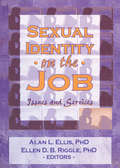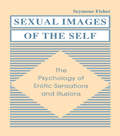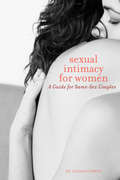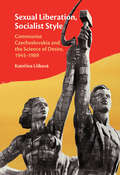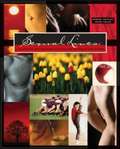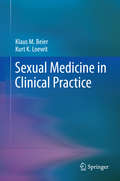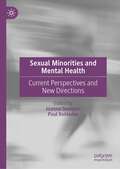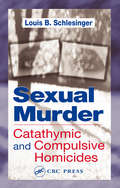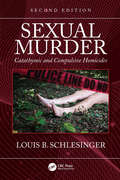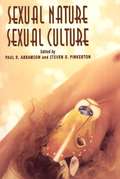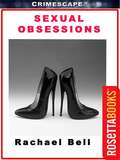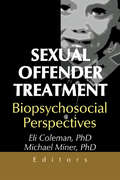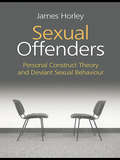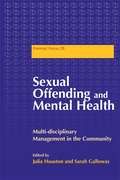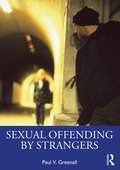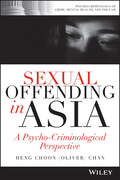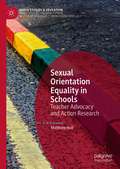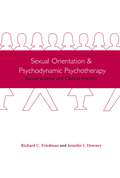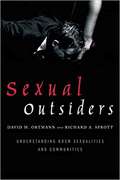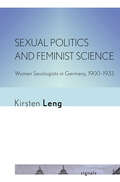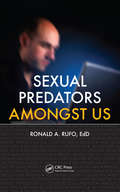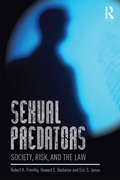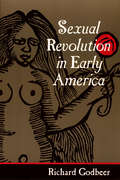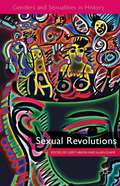- Table View
- List View
Sexual Identity on the Job: Issues and Services
by Alan L Ellis Ellen D RiggleSexual Identity on the Job provides academics and practitioners with a solid resource for addressing sexual identity concerns and issues in the workplace. It offers corporate trainers, managers, and policymakers suggestions for creating a positive psychological environment of inclusion for all workers through policies of nondiscrimination, the availability of domestic partner benefits, and solid efforts to eliminate on-the-job discrimination toward lesbians, gays, bisexuals, and transgender individuals. It educates social service providers about company actions of which they need to know in order to effectively support their gay, lesbian, bisexual, and transgenderedclients.As a compilation of scholarly and applied perspectives, Sexual Identity on the Job covers such topics as multicultural identity (multiple identities) development; legal and policy issues of employment; career development issues for lesbians, gay men, bisexuals, and transgender persons; and how inclusion improves productivity among all groups. By including both perspectives, this unique volume offers both academics and practitioners a broader knowledge of the field and relevant issues, and possible solutions for sexual identity concerns and questions in the workplace.Chapters in Sexual Identity on the Job address a diverse set of issues relating to ways in which those concerned about the psychological well-being of gay, lesbian, bisexual, and transgender workers can address their needs while recognizing their desire to lead productive, fulfilling lives. The contributors, in promoting workplaces that offer all workers inclusion, safety, and a place to thrive psychologically and emotionally, cover such topics as: gay, lesbian, and bisexual career development and counseling issues managing multiple identities (race, gender, sexual orientation) in the workplace current trends in economic discrimination toward lesbians, gay men, and bisexuals and relevant legal concerns domestic partner benefits the relationship between inclusion and productivitySexual Identity on the Job chronicles the development of research, specific concerns which have been addressed, and where current research leaves this situation. It also provides some interpretation of the past and current research and its implications for lesbians, gay men, bisexuals, and transgender workers and their co-workers. It betters relationships among gay and straight workers, administration, and management by promoting equal and fair treatment, in regard to both legal and policy issues and in interpersonal relationships, to all employees. Corporate trainers of all levels, academic researchers, career and other counselors, and the general public will find its pages filled with applicable and helpful information.
Sexual Images of the Self: the Psychology of Erotic Sensations and Illusions
by Seymour FisherThis volume documents how sexual practices and fictions infiltrate and are influenced by a person's feelings about the self and the body. Using paradigms derived from self and body image theory, Fisher combines research from the past several decades dealing with sexual behavior to test major theories concerning diverse sexual phenomena. The book integrates, within a broad conceptual scheme, research findings concerning major aspects of sexual behavior such as the development of sexual competence, orgasm consistence, clitoral versus vaginal preference, and homosexuality.
Sexual Intimacy for Women: A Guide for Same-Sex Couples
by Ph.D. Glenda CorwinSexual Intimacy for Women helps female couples examine the emotional, physical, and psychological aspects of their relationships, with the goal of creating more intimacy. Exercises and client-based anecdotes from Dr. Corwin's years of experience with same-sex couples help women overcome common issues around orgasm, body image, identity, aging, and parenthood. Dr. Corwin dispels myths, examines the intricacies of female desire, and gives advice to help couples achieve long-lasting, healthy, and fulfilling relationships.
Sexual Liberation, Socialist Style: Communist Czechoslovakia and the Science of Desire, 1945–1989
by Kateřina LiškováThis is the first account of sexual liberation in Eastern Europe during the Cold War. Kateřina Lišková reveals how, in the case of Czechoslovakia, important aspects of sexuality were already liberated during the 1950s – abortion was legalized, homosexuality decriminalized, the female orgasm came into experts’ focus – and all that was underscored by an emphasis on gender equality. However, with the coming of Normalization, gender discourses reversed and women were to aspire to be caring mothers and docile wives. Good sex was to cement a lasting marriage and family. In contrast to the usual Western accounts highlighting the importance of social movements to sexual and gender freedom, here we discover, through the analysis of rich archival sources covering forty years of state socialism in Czechoslovakia, how experts, including sexologists, demographers and psychologists, advised the state on population development, marriage and the family to shape the most intimate aspects of people’s lives.
Sexual Lives: A Reader on the Theories and Realities of Human Sexualities
by Betsy Crane Robert HeasleyHistorical, cultural, religious perspectives on sex; sex and the body; gendered sexuality; sex and politics; commodified sex; sexual abuse and rape
Sexual Medicine in Clinical Practice
by Kurt K. Loewit Klaus M. BeierCall it a remnant of our Victorian past, but sexual concerns lag behind other aspects of health, both in the training of physicians and therapists and in the way they impart this knowledge to clients. But as sexuality gains recognition as crucial to one's quality of life, evidence-based methods of understanding and discussing sex are imperative--and not only in treating pathology. Sexual Medicine in Clinical Practice provides framework, rationale, and strategies for both approaching sexual problems and addressing patients' questions about sexual health, behavior, and relationships. Analyzing sexuality along three dimensions--attachment, reproduction, and desire--this concise manual offers a biopsychosocial lifespan model readily translatable into clinical work. This "syndyastic" framework integrates attachment and relational theory to reinforce the bond between intimacy and connectedness, and models nonjudgmental approaches to disorders of sexual function, maturity, preference, and behavior. The authors' salutogenic rather than pathogenic focus lets clients become major players in their own healing, and the therapist or doctor serve as expert and guide. Among the topics covered: The communicative function of sexuality. The spectrum of sexual disorders. Principles of diagnostics in sexual medicine. Disease-centered versus client-centered aspects of sexual therapy. Therapeutic approaches for sexual traumatization. New challenges, including preventing child sexual abuse and online sex crime. Plus case studies, interdisciplinary references, and ethical issues. A timely, perspective- and practice-altering volume, Sexual Medicine in Clinical Practice is essential reading for family and primary care physicians, family and sex therapists, health psychologists, and psychiatrists.
Sexual Minorities and Mental Health: Current Perspectives and New Directions
by Poul Rohleder Joanna SemlyenThis edited book presents a comprehensive guide to the research, challenges and differing perspectives within mental health for sexual minority populations in the UK. Drawing on clinical, social, health and community psychology perspectives, it brings the urgency of this topic back to the fore, providing insight into some of ways we understand and make sense of the increased prevalence of poorer mental health in these populations. Using an intersectional approach, a broad range of experts from across academia and practice explore the specific threat and discrimination faced by sexual minorities and investigate the high prevalence of poor mental health, health risk behaviours and psychological distress in these groups. The volume also offers innovative insight as to ways in which the disparities experienced by sexual minorities may be addressed. Ideal for practitioners in mental health and sexuality, as well as psychologists, policy makers, and academics alike interested in mental health, sexuality, public health, psychotherapy, psychoanalysis, or counselling, this collection features wide array of qualitative and quantitative sources to describe the current state of the art with an interdisciplinary lens.
Sexual Murder: Catathymic and Compulsive Homicides
by Louis B. SchlesingerForensic psychologist and author Louis B. Schlesinger delves deep into the minds of sexual murderers. It is a place where few dare to tread, but a necessary journey if we are to understand the motivations behind their inconceivable actions. Culminating nearly 30 years of experience analyzing sexually motivated homicides, Sexual Murder: Catathymic a
Sexual Murder: Catathymic and Compulsive Homicides
by Louis B. SchlesingerSexual Murder: Catathymic and Compulsive Homicides is the culmination of the author’s 45 years of experience with, and studying, sexually motivated homicide. Sexual murders are generally of two types — catathymic and compulsive. Catathymic homicides are caused by a breakthrough of underlying sexual conflicts. They can be unplanned, explosive (acute) attacks or planned murders stemming from a chronic obsession with, or disturbed attachment to, the victim. In compulsive homicides, a fusion of sex and aggression results in a powerful internal drive which pushes the offender to seek out victims to kill — and the killing itself is sexually gratifying. These murders also may be planned or unplanned. In compulsive homicides that are unplanned, the urge breaks through and disrupts the offender’s controls when a victim of opportunity crosses his path. The compulsive offender who plans his crimes often eludes law enforcement, and as a result he can have multiple (serial) victims over extended periods of time. Both forms of sexual murder — the catathymic and the compulsive — are presented in this volume from a clinical-descriptive perspective encompassing case studies with analysis. Recent advances in empirical research in sexual murder—including findings from the joint research project between John Jay College of Criminal Justice and the FBI Behavioral Analysis Unit in Quantico—has published many important studies. These include such topics as necrophilia, foreign object insertions in sexual homicide, ritual and signature and temporal patterns in serial sexual homicide, mass murder, crime scene staging in homicide, and undoing (symbolic reversal) at homicide scenes. All such research will be included and incorporate into this fully updated Second Edition, including approximately fifty new clinical case studies.
Sexual Nature, Sexual Culture (Chicago Series On Sexuality, History And Society)
by Paul Abramson Steven PinkertonIn this multidisciplinary study of human sexuality, an international team of scholars looks at the influences of nature and nurture, biology and culture, and sex and gender in the sexual experiences of humans and other primates. Using as its center the idea that sexual pleasure is the primary motivational force behind human sexuality and that reproduction is simply a byproduct of the pleasurability of sex, this book examines sexuality at the individual, societal, and cultural levels. Beginning with a look at the evolution of sexuality in humans and other primates, the essays in the first section examine the sexual ingenuity of primates, the dominant theories of sexual behavior, the differences in male and female sexual interest and behavior, and the role of physical attractiveness in mate selection. The focus then shifts to biological approaches to sexuality, especially the genetic and hormonal origins of sexual orientation, gender, and pleasure. The essays go on to look at the role of pleasure in different cultures. Included are essays on love among the tribespeople of the Brazilian rain forest and the regulation of adolescent sexuality in India. Finally, several contributors look at the methodological issues in the study of human sexuality, paying particular attention to the problems with research that relies on people's memories of their sexual experiences. The contributors are Angela Pattatucci, Dean Hamer, David Greenberg, Frans de Waal, Mary McDonald Pavelka, Kim Wallen, Donald Symons, Heino Meyer-Bahlburg, Jean D. Wilson, Donald Tuzin, Lawrence Cohen, Thomas Gregor, Lenore Manderson, Robert C. Bailey, Alice Schlegel, Edward H. Kaplan, Richard Berk, Paul R. Abramson, Paul Okami, and Stephen D. Pinkerton. Spanning the chasm of the nature versus nurture debate, Sexual Nature/Sexual Culture is a look at human sexuality as a complex interaction of genetic potentials and cultural influences. This book will be of interest to a wide range of readers—from scholars and students in psychology, anthropology, sociology, and history to clinicians, researchers, and others seeking to understand the many dimensions of sexuality.
Sexual Obsessions Gone Wrong
by Marilyn J. Bardsley Rachael Bell(A 58-page True Crime Short with photographs) Just when you think you've heard it all... An entertaining and at times tongue-and-cheek look into cases of bizarre sexually obsessive behaviors (paraphilias) that had unintended consequences. Each chapter briefly explores the lesser-known fetishes and fixations to the more common ones that unexpectedly led to severe injury, imprisonment and death. Case-by-case accounts provide insight into the circumstances surrounding such infamous incidences as the deaths of INXS singer Michael Hutchence and actor David Carradine, who were believed to have accidently died from auto-erotica asphyxiation, and the more recent Northern Virginia "Serial Butt Slasher" case, where women shopping in malls were brutally stabbed in the behind by an by a suspect identified on a mall video tape. These unusual and often disconcerting accounts seriously challenge the adage "What feels good can't be wrong."
Sexual Offender Treatment: Biopsychosocial Perspectives
by Edmond J Coleman Michael MinerGain a better understanding of the biological, psychological, and social aspects of sex offenders, their crimes, and the treatments that can help them The treatment of sexual offenders varies from culture to culture and nation to nation. Sexual Offender Treatment: Biopsychosocial Perspectives assists sex therapists, counselors, psychiatrists, and psychologists working in sex offender treatment around the world in providing more effective services. This book looks at the behavior of sexual offenders and offers treatment approaches that will stimulate your thinking and help you improve your research and treatment methodologies. This valuable and informative book introduces and discusses the formation of the new International Association for the Treatment of Sexual Offenders, which will advance the existing knowledge about the nature of sexual offenders and sexual offenses, work to improve treatment methods and disseminate information about improved methods, and scientifically evaluate therapeutic methods advocate for the right of sex offenders to effective treatment.Sexual Offender Treatment: Biopsychosocial Perspectives presents an overview of recent research in the treatment of sexual offenders as presented at the 5th International Conference on the Treatment of Sexual Offenders in 1998 in Caracas, Venezuela. This book explores: the recently revised Standards of Care for the Treatment of Sexual Offenders self-perceived aggression in relation to brain abnormalities in a sample of incarcerated sexual offenders self-concepts and interpersonal perceptions of sexual offenders in relation to brain abnormalities brain abnormalities and violent behavior group family interventions for the treatment of adult male child molesters the experiences of adult and adolescent female sex offenders a 7 step system to treat pedophiles who are mentally retarded, mentally ill or physically handicappedSexual Offender Treatment: Biopsychosocial Perspectives provides you with valuable insights and a cross-cultural viewpoint as you benefit from the expertise and experience of international scholars who have set the standards for the treatment of sex offenders.
Sexual Offenders: Personal Construct Theory and Deviant Sexual Behaviour
by James HorleyIs there an alternative way of treating sexual offenders beyond traditional psychiatry? Sexual Offenders explores and develops personal construct theory in terms of forensic and social psychology, and examines the possibilities for sexual offender assessment and therapy. Rather than viewing sexual offenders as having a mental illness or possessing a set of pathological personality traits, personal construct theory indicates that all people learn particular ways of understanding their own experience, and use these 'personal constructs' to anticipate the future. Through a variety of experiences, sexual offenders appear to develop a set of constructs that demands a particular understanding of themselves and other people. James Horley suggests that if they desire change sexual offenders can alter these constructs through psychotherapy. Sexual Offenders describes a number of techniques used by the author and other clinicians as well as presenting new and more dynamic approaches to psychological assessment. Based on over 20 years of the author's clinical and research work, this book will provide professionals and students in the field of forensic psychology and psychiatry with an alternative way of treating sex offender clients.
Sexual Offending and Mental Health: Multidisciplinary Management in the Community
by Jackie Craissati Alison Beck Julia Houston Andrew Aboud Sarah GallowaySexual Offending and Mental Health draws together theoretical, clinical and mental health issues for the range of professionals working in the community and in-patient settings with sex offenders and those who have behaved in sexually inappropriate ways. The contributors describe current influential models of sexual offending and the developmental, psychological and social factors involved. They discuss the prevalence of personality and mental disorders in known sex offenders and the impact these disorders have on their treatment and management. They describe clinical work with individuals, their partners and families, and also consider the impact of this work on professionals. The book includes an outline of current approaches to risk assessment, an overview of the recent changes in legislation in England and Wales, and suggestions for multi-disciplinary management in the community. This book will be essential reading for professionals working in health or criminal justice settings with people who have committed sexual offences or whose sexual behaviour has caused concern for others.
Sexual Offending by Strangers
by Paul V. GreenallExploring a specific type of sexual violence committed by a specific type of sexual offender, namely adult male on adult female stranger sexual violence, this book provides readers with an enhanced understanding of both the offences being committed and the offenders who commit them. Although acts of serious stranger sexual violence are rare, they are important as they occur in the context of there being no pre-existing relationship between the offender and victim, meaning they present significant challenges to criminal justice practitioners who are required to investigate, assess and understand such offending. Arguing for the importance of adopting an ideographic perspective, this book encourages readers to draw upon a variety of different theories and models as appropriate, such as considering the impact of a behavioural conditioning process, where sexual violence is a manifestation of prior learning or early life experiences. Divided into four sections, this comprehensive volume guides the reader through key concepts, different types of stranger sexual violence, and applications to criminal justice practice.Sexual Offending by Strangers will be of use to police officers, prison officers, and practitioners working with offenders in either secure or community settings. It will also be of value to students and scholars researching the topic of sexual violence.
Sexual Offending in Asia: A Psycho-Criminological Perspective (Psycho-Criminology of Crime, Mental Health, and the Law)
by Heng Choon ChanSEXUAL OFFENDING inASIA AUTHORITATIVE AND THOUGHT-PROVOKING WORK DETAILING THE PSYCHO-CRIMINOLOGICAL FACTORS INFLUENCING AND AFFECTING SEXUAL OFFENDERS IN ASIA Sexual Offending in Asia examines sexual offending from a general Asian perspective with a psycho-criminological approach (i.e., personal, social, and environmental mechanisms) to provide comprehensive coverage of different topics from both theoretical and practical (i.e., practice and policy) standpoints. This book is part of The Wiley Series in the Psycho-Criminology of Crime, Mental Health, and the Law, which aims to publish original, high-quality authored and edited collections on all aspects of crime, mental health, and the law from a psycho-criminological perspective. Sexual Offending in Asia is divided into two main sections—i.e., Part 1: Theories of Sexual Offending and Part 2: Sexual Offending in Asia—with five chapters in each section. In the second section, each chapter concludes with two case examples to illustrate the sexual offending phenomenon of each geographical location. Written by an award-winning author with significant experience in the field, Sexual Offending in Asia provides coverage of topics such as: Multi-level theories of general sexual offending, including multi-factorial (Level 1), single factor (Level ll), and micro-level or offense process (Level lll) theories of sexual offending for specific sex offender populations, including female sex offenders and sexual homicide offenders Sexual offending in Asia is discussed based on 5 geographical regions, namely East Asia, Southeast Asia, South Asia, West Asia, and Central Asia. Sexual offending in each geographical region is discussed comprehensively, including the prevalence and nature of sexual offending; cultural values and norms related to sexual offending; offender, victim, and offense characteristics; penal codes; and case examples Sexual Offending in Asia will be of immense interest not only to researchers and field practitioners whose work brings them into contact with sexual offenders, but more specifically to those who wish for an informed and informative understanding of Asian sexual offending regarding prevention and intervention strategies.
Sexual Orientation Equality in Schools: Teacher Advocacy and Action Research (Queer Studies and Education)
by Matthew HoltThis book explores how to help teachers become better advocates for sexual orientation equality in secondary schools. Examining this issue through the lens of qualitative emancipatory action research, a group of Australian teachers embarked on a journey of teacher advocacy. Critical theory has long highlighted teachers as key players in either challenging dominant social narratives, or else perpetuating oppressive systems of power through traditional forms of education. Despite this important role, the life stories of teachers, which contributed to the development of their beliefs and behaviours about sexual orientation are rarely considered in the development of anti-discriminatory policy, designing the curriculum and most importantly, in teacher training. This book suggests and frames a model for advocacy, whereby teachers engage with their personal beliefs about sexual orientation, with their role as a teacher, and commit to advocacy through action by promoting student safety, challenging heteronormative narratives and role modelling compassionate behaviours in their school environments.
Sexual Orientation and Psychodynamic Psychotherapy: Sexual Science and Clinical Practice
by Richard Friedman Jennifer DowneyThis book bridges psychoanalytic thought and sexual science. It brings sexuality back to the center of psychoanalysis and shows how important it is for students of human sexuality to understand motives that are often irrational and unconscious. The authors present a new perspective about male and female development, emphasizing the ways in which sexual orientation and homophobia appear early in life. The clinical section of the book focuses on the psychodynamics and treatment of homophobia and internalized homophobia.
Sexual Orientation and Psychodynamic Psychotherapy: Sexual Science and Clinical Practice
by Richard Friedman Jennifer DowneyThis book bridges psychoanalytic thought and sexual science. It brings sexuality back to the center of psychoanalysis and shows how important it is for students of human sexuality to understand motives that are often irrational and unconscious. The authors present a new perspective about male and female development, emphasizing the ways in which sexual orientation and homophobia appear early in life. The clinical section of the book focuses on the psychodynamics and treatment of homophobia and internalized homophobia.
Sexual Outsiders: Understanding BDSM Sexualities and Communities
by David M. Ortmann Richard A. SprottSexual Outsiders: Understanding BDSM Sexualities and Communities delves into the unique experiences of individuals in BDSM communities. While misunderstandings surrounding these communities prevail, BDSM sexuality cuts across race, gender, nationality, and sexual orientation. BDSM describes forms of sexuality that incorporate restraint, pressure, sensation, training, and elements of both erotic and non-erotic power exchange between the engaged parties. Some BDSM “scenes” include role-playing, spanking, blindfolds, ropes, and erotic costuming. <p><p> Sexual Outsiders is designed as a guide for BDSM community members who must wade through the quagmire of unique problems they face: coming out to family, friends and partners; distinguishing abusive relationships from healthy consensual ones; finding and developing community; overcoming shame and denial; exploring whether BDSM sexuality can be a healing tool; gaining access to quality, culturally competent psychotherapy; and finding strategies to develop a healthy sexual self-esteem in the face of current medical and social standards that view them as sick or pathological. The book also serves as an educational primer for those whose partners, friends, and family members are involved in BDSM. <p><p> In terms of challenges faced by BDSM communities, the most significant is living with a stigmatized sexuality shame, prejudice, discrimination, isolation, depression, and a lack of adequate, competent mental health care. Issues such as coming out as a sexual minority, finding community and partners, and dealing with scenes and relationships that go wrong are some the common experiences shared by members of BDSM communities. Sexual Outsiders employs common sense, good humor, and vivid anecdotes while incorporating basic ideas about human behavior, psychology, philosophy, interviews, history, and clinical case studies to illustrate the real lives and experiences of men and women in BDSM communities. Anyone wanting to learn more about this unique, and more-common-than-you-think expression of sexuality, will find in these pages insight into the various challenges BDSM practitioners face, and the many strengths that people in the BDSM communities have developed in the face of social stigma and prejudice.
Sexual Politics and Feminist Science: Women Sexologists in Germany, 1900–1933 (Signale: Modern German Letters, Cultures, and Thought)
by Kirsten LengIn Sexual Politics and Feminist Science, Kirsten Leng restores the work of female sexologists to the forefront of the history of sexology. While male researchers who led the practice of early-twentieth-century sexology viewed women and their sexuality as objects to be studied, not as collaborators in scientific investigation, Leng pinpoints nine German and Austrian "women sexologists" and "female sexual theorists" to reveal how sex, gender, and sexuality influenced the field of sexology itself. Leng’s book makes it plain that women not only played active roles in the creation of sexual scientific knowledge but also made significant and influential interventions in the field. Sexual Politics and Feminist Science provides readers with an opportunity to rediscover and engage with the work of these pioneers.Leng highlights sexology’s empowering potential for women, but also contends that in its intersection with eugenics, the narrative is not wholly celebratory. By detailing gendered efforts to understand and theorize sex through science, she reveals the cognitive biases and sociological prejudices that ultimately circumscribed the transformative potential of their ideas. Ultimately, Sexual Politics and Feminist Science helps readers to understand these women’s ideas in all their complexity in order to appreciate their unique place in the history of sexology.
Sexual Predators Amongst Us
by Ronald A. RufoIt is imperative that educators, parents, and potential victims be aware of sexual predators, the danger they pose in our society, and the resources available to help prevent this growing epidemic. Written from a police perspective, Sexual Predators Amongst Us examines the problem of sexual predation, how the Internet has contributed to its growth,
Sexual Predators: Society, Risk, and the Law (International Perspectives on Forensic Mental Health)
by Robert A. Prentky Howard E. Barbaree Eric S. JanusConvicted sex offenders released from custody at the end of their criminal sentences pose a risk for re-offense. In many US states, Sexually Violent Predator (SVP) laws have been enacted that allow for the post-prison preventive detention of high risk sex offenders. SVP laws require the courts to make dispositions that protect the public from harm while at the same time respecting the civil rights of the offender. This book describes these SVP laws, their constitutionality, and aspects of their operation. Courts hear expert risk testimony based heavily on the results of actuarial risk assessment. Problems associated with this testimony include the lack of a theory of recidivism risk, bias due to human decision-making, and the insularity of scholarship and practice along developmental lines. The authors propose changes in legal standards, as well as a unified developmental model that treats sexual violence as an "evolving" condition, with roots traceable to childhood and paths that extend into adolescence and adulthood.
Sexual Revolution in Early America (Gender Relations in the American Experience)
by Richard GodbeerAn Alternate Selection of the History Book ClubIn 1695, John Miller, a clergyman traveling through New York, found it appalling that so many couples lived together without ever being married and that no one viewed "ante-nuptial fornication" as anything scandalous or sinful. Charles Woodmason, an Anglican minister in South Carolina in 1766, described the region as a "stage of debauchery" in which polygamy was "very common," "concubinage general," and "bastardy no disrepute." These depictions of colonial North America's sexual culture sharply contradict the stereotype of Puritanical abstinence that persists in the popular imagination.In Sexual Revolution in Early America, Richard Godbeer boldly overturns conventional wisdom about the sexual values and customs of colonial Americans. His eye-opening historical account spans two centuries and most of British North America, from New England to the Caribbean, exploring the social, political, and legal dynamics that shaped a diverse sexual culture. Drawing on exhaustive research into diaries, letters, and other private papers, as well as legal records and official documents, Godbeer's absorbing narrative uncovers a persistent struggle between the moral authorities and the widespread expression of popular customs and individual urges.Godbeer begins with a discussion of the complex attitude that the Puritans had toward sexuality. For example, although believing that sex could be morally corrupting, they also considered it to be such an essential element of a healthy marriage that they excommunicated those who denied "conjugal fellowship" to their spouses. He next examines the ways in which race and class affected the debate about sexual mores, from anxieties about Anglo-Indian sexual relations to the sense of sexual entitlement that planters held over their African slaves. He concludes by detailing the fundamental shift in sexual culture during the eighteenth century towards the acceptance of a more individualistic concept of sexual desire and fulfillment. Today's moral critics, in their attempts to convince Americans of the social and spiritual consequences of unregulated sexual behavior, often harken back to a more innocent age; as this groundbreaking work makes clear, America's sexual culture has always been rich, vibrant, and contentious.
Sexual Revolutions
by Gert Hekma Alain GiamiSexual Revolutions explores the sexual revolution of the late twentieth century in several European countries and the USA by engaging with themes from sexual freedom and abortion to pornography and sexual variation. This work discusses the involvement of youth, feminism, left, liberalism, arts, science and religion in the process of sexual change.
